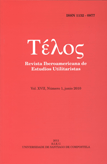Mill As A Moral Philosopher (Some Comments On Frederick Rosen´S Mill)
plugins.themes.xejournal.article.main
Resumo
First, I want to thank Professor Rosen’s deep and illuminating study of the Philosophy of Stuart Mill. In my view, one of the most important contributions of the author is his claim that Mill was not only a social moralist but was primarily a philosopher and a logician. In many ways, Rosen is right. Mill was not a moral philosopher, or at least was not only a moral philosopher. However, he was concerned with the part of philosophy that deals with morality and enthusiastically defended both the welfare and the individual and social development. First, I want to thank Professor Rosen’s deep and illuminating study of the Philosophy of Stuart Mill. In my view, one of the most important contributions of the author is his claim that Mill was not only a social moralist but was primarily a philosopher and a logician. In many ways, Rosen is right. Mill was not a moral philosopher, or at least was not only a moral philosopher. However, he was concerned with the part of philosophy that deals with morality and enthusiastically defended both the welfare and the individual and social development.
As we say, Mill was not only a moral philosopher, because in many cases he anticipated to contemporary metaphysics, showing that the principles of normative ethical could be defended so that the human intellect helps to understand them. Even so, it should be added that Mill was, however, a reformer and a defender of moral character education. I think no exaggeration to say that Mill used logic and reasoning as ways to promote intellectual and moral development of all human beings, which is necessary for the individual improvement of welfare and social harmony. Reading Mill carefully is discovered that all his reasoning and use of the senses is aimed at deepening the welfare of all members of humanity, recommending the highest pleasures (more developed). Being a moral philosopher is not so, and as Fred Rosen suggests in his brilliant work, an obstacle to Mill being a defender of ethical revolution of society, i.e., the transformation of human life.
Thus, while I deeply admire the contribution of Professor Rosen to the study of Mill, I will show my disagreement with it at some length, and finally I will also summarize the main points of convergence between the study of Rosen and my own view of John Stuart Mill’s thought.
DOI http://dx.doi.org/10.15304/t.20.1.2623
Palavras-chave:
plugins.themes.xejournal.article.details
plugins.generic.recommendByAuthor.heading
- Esperanza Guisán, A FAVOR DE LA SISTEMATIZACIÓN EN ÉTICA (UNA RÉPLICA A JAMES GRIFFIN) , Télos: v. 1 n. 1 (1992)
- Esperanza Guisán, Las personas en serio (Los derechos humanos y el Bienestar) , Télos: v. 5 n. 1 (1996): La polémica entre John Harsanyi y Amartya Sen.
- Esperanza Guisán, Un relato personal. , Télos: v. 17 n. 2 (2010): Homenaje Internacional a Esperanza Guisán (Volumen I)
- Esperanza Guisán, Presentación , Télos: v. 1 n. 3 (1992): 500 Quinto Centenario del Descubrimiento de América
- Esperanza Guisán, Nicolás María López Calera, Carmen Verde Diego, Manuel Segura Ortega, Joaquín Rodríguez Toubes-Muñiz, Recensiones , Télos: v. 1 n. 3 (1992): 500 Quinto Centenario del Descubrimiento de América






